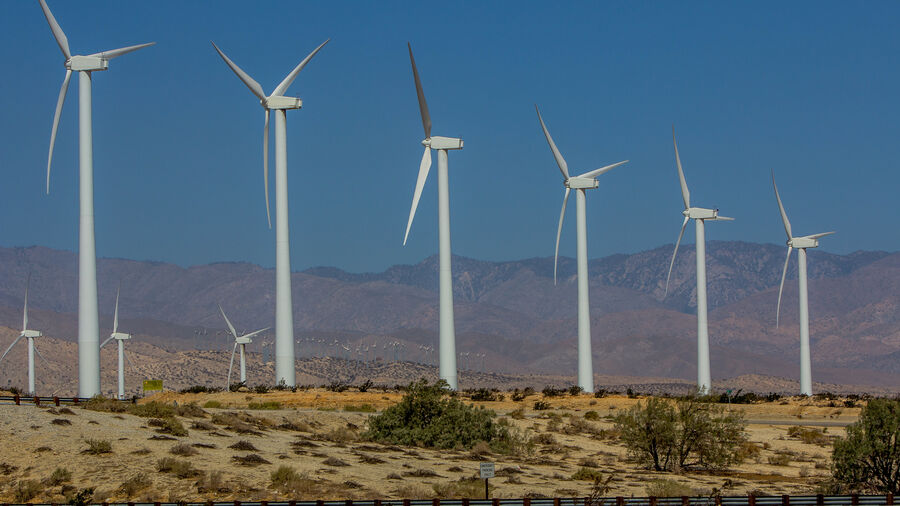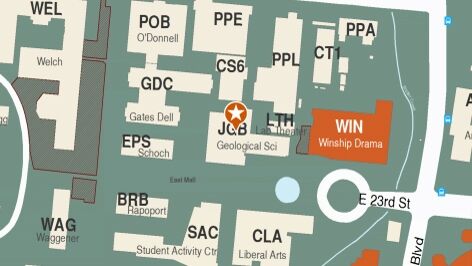Environmental Science
Interdisciplinary Major

The complex nature of environmental problems demands that environmental scientists be prepared to analyze issues from multiple perspectives, integrating knowledge of science and social science, law and public policy, and issues of resource management and sustainability.
UT's environmental science major prepares graduates for a quantitative and interdisciplinary approach to examining ecosystems and addressing issues such as conservation, biodiversity, soil contamination, groundwater contamination, climate change, the quality of water, waste management, sustainable development and resources, air pollution, noise pollution and the destructive use of natural resources.
This interdisciplinary degree is operated collaboratively by UT's College of Natural Sciences, Jackson School of Geosciences, and College of Liberal Arts.
EVS students complete coursework across the three major environmental scientific disciplines—biology, geology, and geography. This interdisciplinary focus offers a different perspective for students than traditional department-specific degrees which focus more deeply—and more exclusively—on the chosen discipline, particularly during the early years of study.
EVS students are required to engage in both field and research experience within the first two years of the program. At the conclusion of their studies, EVS students have an additional opportunity to culminate their journey with advanced field and/or research experience.
Freshman and External Transfer Admission
ShowProspective UT Austin students can apply to the EVS Program on their application to the university by selecting "environmental science" as their major at the College of Natural Sciences, Jackson School of Geosciences, or the College of Liberal Arts. Applicants should apply through the college they believe best suits their academic interests and needs.
Internal Transfer Requirements
ShowCurrent UT students interested in the EVS program should meet the following requirements to be competitive for internal transfer admissions.
Current UT Austin students interested in the EVS program are encouraged to attend an informational session before submitting their EVS application. Applications are typically open during the month of February for program entry in the following academic year.
Required Courses
ShowDuring the first two years, all EVS students take a set of core science courses, one field seminar, an introductory environmental science course, and other interdisciplinary coursework. After completing the first two years, students choose one of the three EVS tracks: biological, geological, and geographical science. For more detailed information, check out the EVS FAQ page.
Specializations
ShowAfter completing the first two years of the program, students must select one of three track options. All three tracks are offered through different colleges:
- Biological Science College of Natural Science
- Geological Science Jackson School of Geoscience
- Geographical Science College of Liberal Arts
Learn more about the differences between the three tracks.
Incoming freshmen admitted to the EVS program are allowed to begin their coursework in any of the participating colleges (Natural Sciences, the Jackson School, or Liberal Arts). Internal transfer students admitted to the EVS program can remain in their current college until they choose an EVS track.
Personality
ShowEVS students are scientifically-minded, critical thinkers, and strong writers. They are passionate about ethical and economical challenges. Students do not shy away from thinking about big decisions like the future health of environmental systems.
Skills
ShowEVS trains students broadly, emphasizing much-needed skills in critical thinking and writing, individual research, ethical and economical challenges, and the multi-pronged impact of decision-making on the future health of environmental systems. EVS students gain training and practice in the following skills:
- Statistical analysis, including conducting and interpreting t-test, ANOVA, and regressions
- Analysis of data quality
- Multidisciplinary group communication and project development
- Compiling historical data from government agencies
- Finding and evaluating primary literature from a variety of sources
- Drafting Environmental Impact Assessments, as well as writing short scientific reports
- GIS training, along with traditional map reading and interpretation
- Field measurement of water quality parameters in marine and freshwater environments
- Identification of carbonate rock types and vegetation types
- Measurement of vegetation transects, synthesis of ecological and hydrological data, and interpretation of water quality data
EVS graduates will be prepared for a variety of careers and pathways into the workforce, generally at state, local, and federal agencies and consulting firms. Graduates will be prepared and ready to conduct scientific analysis of human impacts on the environment, and to communicate the results of that analysis effectively. EVS graduates are also competitive for entry into top-ranked master's and Ph.D. science programs. But regardless of the path they choose, EVS student can expect professional careers in a variety of fields, including: environmental assessment, planning and management, sustainable development, green investment planning, environmental education and protection, water resource analysis, energy resource analysis, and multiple aspects of natural resource studies and management at all levels of government as well as in private and non-governmental organizations from local to international scope.
